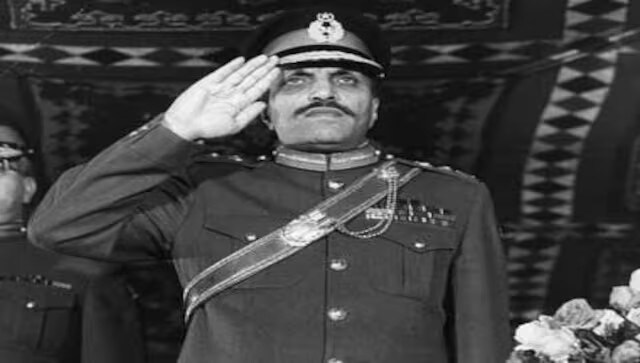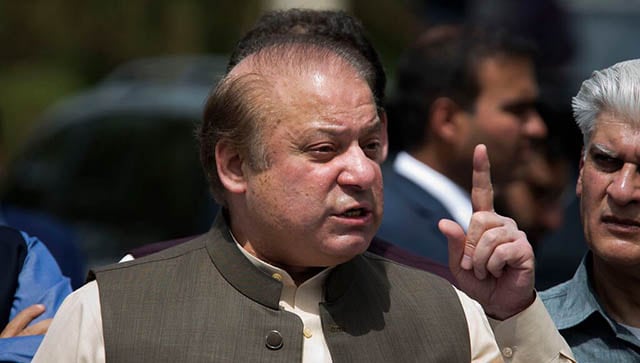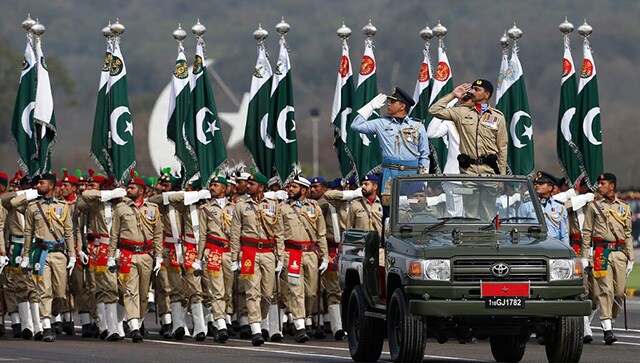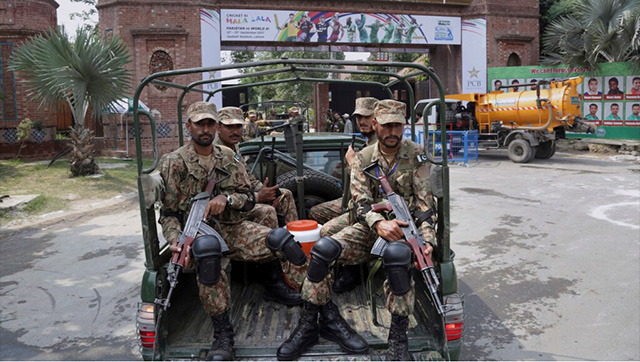Pakistan is gearing up for its parliamentary polls this week. The Pakistan Muslim League-Nawaz (PML-N) of Nawaz Sharif, the Pakistan Tehreek-e-Insaf (PTI) of Imran Khan and the Pakistan People’s Party (PPP) of Bilawal Bhutto-Zardari are all vying for power. But many voters remain sceptical that any of the parties will be able to change their lives for the better. This is because the Pakistan army, which has been the dominant force in the country since its inception, continues to have a huge influence over the polls. But how has the army been a factor in elections? How does it wield power? Let’s take a closer look: A brief look at Pakistan army First, let’s take a brief look at the Pakistan Army.
As per Dawn, the Pakistan army has its origins in the British Indian Army (BIA).
It was established in August 1947. British General Frank Messervy was the first army chief. Over the next few decades, the army spread its tentacles to every part of Pakistani life. “There are armies which guard their nation’s borders, there are armies which are concerned with protecting their own position in society, and there are armies which defend a cause or an idea. The Pakistan army does all three,” Stephen P Cohen noted in his piece Pakistan: Army, Society and Security. A piece in The Conversation noted three main reasons for the Pakistan army exerting control over politics
- Its fear of war with India
- Need to control foreign policy
- Desire to protect its interests
Little wonder then that Pakistan has spent nearly half of its existence under military rule.
In the past, elected governments have been ousted by military intervention, including three coups or indirect pressure from generals.
In its 76-year history, no prime minister has ever completed a five-year term. Long history of military rule As per The Quint, Pakistan witnessed its first military coup barely a decade after gaining freedom when General Ayub Khan deposed then president Iskander Mirza. General Yahya Khan, who took over from Ayub in 1969, held the position until Pakistan lost the war to India. Then Zulfiqar Ali Bhutto took over. Bhutto, who would go on to be prime minister, was then deposed and executed by General Zia ul Haq in 1979. Zia ruled Pakistan with a tight first – imposing martial law, suspending the constitution, dissolving the National and state Assemblies, banning political parties and postponing elections indefinitely. [caption id=“attachment_13277262” align=“alignnone” width=“640”] General Zia ul-Haq died in a plane crash in 1988.[/caption] It was only in 1985 that Zia would allow a government to be formed under then prime minister Muhammad Khan Junejo. However, Zia took over as president and remained so until 1988 when he died in a plane crash.
General Zia ul-Haq died in a plane crash in 1988.[/caption] It was only in 1985 that Zia would allow a government to be formed under then prime minister Muhammad Khan Junejo. However, Zia took over as president and remained so until 1988 when he died in a plane crash.
Junejo, meanwhile, was himself removed in 1987.
Things flared up in the late 1990s after Nawaz Sharif returned to power. Sharif held power for two years before being deposed by his then Army Chief Pervez Musharraf in 1997. Musharraf, the brains behind Pakistan’s misadventure in Kargil, would remain in power till 2008. This isn’t to say that the Pakistan army has played no role in state affairs when a civilian government is ostensibly in charge. Quite the opposite in fact.
As a 2022 piece in Firstpost noted,
“…the Generals in Pakistan have evolved politically and are smarter than Pakistani politicians; they mostly facilitate the election process and government formation under their preferred leader and thereafter nudge him to govern the country their way for obvious commercial reasons.” As per Foreign Policy, after Sharif took office again in 2013, the military threw its backing behind Imran. However, a terror attack resulted in Imran calling off his mass movement against the government. By 2017, Sharif sought more control over Pakistan’s foreign policy towards India. [caption id=“attachment_13294782” align=“alignnone” width=“640”] The military deposed Nawaz Sharif again after a difference of opinion over Pakistan’s foreign policy with regard to India. AP[/caption] The Conversation piece noted that Sharif, just before the elections, was swiftly arrested and given a 10 year jail term. Meanwhile, Imran Khan swept into office – with the backing of the generals. But soon the army began tussling with Imran as well. The piece noted that Imran made the mistake of riling up then Pakistan army chief Qamar Javed Bajwa over his pick of the chief minister of Punjab province. Then, Imran openly defied Bajwa in 2021 over the pick of ISI chief – which may have been the last straw.
The military deposed Nawaz Sharif again after a difference of opinion over Pakistan’s foreign policy with regard to India. AP[/caption] The Conversation piece noted that Sharif, just before the elections, was swiftly arrested and given a 10 year jail term. Meanwhile, Imran Khan swept into office – with the backing of the generals. But soon the army began tussling with Imran as well. The piece noted that Imran made the mistake of riling up then Pakistan army chief Qamar Javed Bajwa over his pick of the chief minister of Punjab province. Then, Imran openly defied Bajwa in 2021 over the pick of ISI chief – which may have been the last straw.
Now, it seems things have gone full circle with Imran being out of favour and the military seemingly backing Nawaz again.
The Indian Express noted that the military has gone full tilt against the PTI.
Though Imran remains a beloved figure, PTI workers have been thrown into jails, the party has lost its election symbol and there are even reports
that PTI candidates are not being allowed to stand for office.
This, after the military went so far as to even bar the media from using Imran’s name in stories.
“Our party is being pushed against a wall,” a PTI campaigner in Islamabad told RFERL.
A former PTI lawmaker added there is “deep-rooted interference in this election.”
“We do expect rigging but we are trying our best to counter it by bringing out our supporters to vote in large numbers.”
In essence, Pakistan is no longer a true democracy.
“The expanded powers that the Pakistani Army now possesses seem to classify the state as what scholar Ayesha Siddiqa calls a hybrid-martial law system, in which all real power lies with the military while a civilian government is relegated to the position of junior partner,” the Foreign Policy piece noted.
Military Inc Pakistan’s Army doesn’t just control the country’s politics. The Pakistan’s military influence over the nation’s economy has only grown in recent years.
The military’s role in economic decision-making has since been formalised by its representation in the a new high-powered body called the Special Investment Facilitation Council.
Retired and serving generals are on key posts in many state institutions.
As per The Conversation, the military accounted for almost 18 per cent of government spending in 2022.
It also owns millions of acres of public land.
The military is also a business behemoth.
A piece in Economic Times valued the military’s business holdings at $100 billion – which would make it Pakistan’s biggest conglomerate.
Pakistan’s military runs almost 100 businesses, it added.
[caption id=“attachment_13651372” align=“alignnone” width=“640”] The Pakistan’s military influence over the nation’s economy has only grown in recent years. AP[/caption]
The Pakistan’s military influence over the nation’s economy has only grown in recent years. AP[/caption]
“You can’t get out of a grocery store or a shopping mall without having bought a few items manufactured by a military company. From cornflakes to breads and biscuits and cement to fertiliser, the military makes and sells everything. From airlines to logistics companies and banks to insurance, the military runs everything,” the piece noted.
An October 2023 Firstpost piece also noted that the economic downturn in Pakistan seemingly had no affect on the military.
“Led by the Army’s Fauji Foundation (FF), Navy’s Bahria Foundation (BF) and Air Force’s Shaheen Foundation (SF), the armed forces have increased their hold on economic sectors of the country, effectively turning the Army generals and their colleagues in other services as landlords, real-estate tycoons and business moguls. Multiple reports have alleged that Pakistani Army officers use these ventures as a front for corruption, capitalising on their autonomy and lack of institutional accountability,” the piece noted.
Regardless of which party takes power, the new government will need to maintain a balance between keeping the country’s powerful generals happy while charting out its own policies.
A rare misstep?
But the army may have made a misstep in the run-up to the polls. Imran’s May 2023 arrest triggered destructive rampages on a scale unseen since the 2007 assassination of former prime minister Benazir Bhutto. Imran’s supporters blamed the military for his demise and set about wrecking military buildings and property — a strong message of defiance.
The authorities responded with mass arrests, a crackdown on Imran’s party, and the introduction of military trials for civilians.
Impact Shorts
More ShortsThe clampdown appears to have broken some of that spirit, though a recent pre-election rally in the southern city of Karachi, where police were forced to disperse Imran’s supporters with tear gas, showed that some were ready to fight for him. Despite the army’s attempts to take Imran off the chessboard, his absence from the ballot remains at the forefront of public discourse in Pakistan. Though it’s become the norm for corruption allegations and court cases to dog prime ministers — many of Pakistan’s leaders have been arrested, disqualified or ousted from office — the intensity of the legal action against Imran is unprecedented. [caption id=“attachment_13695052” align=“alignnone” width=“640”] Despite the army’s attempts to take Imran Khan off the chessboard, his absence from the ballot remains at the forefront of public discourse in Pakistan. AFP[/caption] Imran is in prison and with four criminal convictions so far, three of them handed down last week, he is barred from running in elections or holding public office. He’s been sentenced to three, 10, 14 and seven years, to be served concurrently, and has more than 150 other legal cases pending against him. His party says it’s not getting a fair chance to campaign. What do experts say? That free and fair elections really aren’t really possible in such a scenario. “These elections won’t have any legitimacy, even less than the 2018 elections,” Zaigham Khan, a political analyst and columnist based in Islamabad told The New York Times. “And if an elected government doesn’t have legitimacy, you can’t expect to see political stability or economic stability.” “It looks unlikely that PTI voters will come out; they feel that they already know the election result, it’s predetermined,” Mohammad Waseem, a professor of political science at the Lahore University of Management Sciences told the newspaper. Military affairs scholar Ayesha Siddiqa warns of more instability as the anti-establishment sentiment grows.
Despite the army’s attempts to take Imran Khan off the chessboard, his absence from the ballot remains at the forefront of public discourse in Pakistan. AFP[/caption] Imran is in prison and with four criminal convictions so far, three of them handed down last week, he is barred from running in elections or holding public office. He’s been sentenced to three, 10, 14 and seven years, to be served concurrently, and has more than 150 other legal cases pending against him. His party says it’s not getting a fair chance to campaign. What do experts say? That free and fair elections really aren’t really possible in such a scenario. “These elections won’t have any legitimacy, even less than the 2018 elections,” Zaigham Khan, a political analyst and columnist based in Islamabad told The New York Times. “And if an elected government doesn’t have legitimacy, you can’t expect to see political stability or economic stability.” “It looks unlikely that PTI voters will come out; they feel that they already know the election result, it’s predetermined,” Mohammad Waseem, a professor of political science at the Lahore University of Management Sciences told the newspaper. Military affairs scholar Ayesha Siddiqa warns of more instability as the anti-establishment sentiment grows.
“People are angry,” Siddiqa said.
“The dislike of the army has increased tremendously, and it’s more noticeable.” A piece in The Conversation noted that the military deciding who will take the reigns of power makes the idea of free and fair polls redundant. “The military’s political engineering has ensured that it is impossible for there to be a level playing field for the parties on election day. It only remains to be seen if citizens will turn out to exercise their right to vote,” the piece concluded. “Nothing will change,” Zubair, a resident of the northwestern city of Peshawar told RFERL. “A few individuals will choose who will rule this country.” The outlet quoted a poll stating that 70 per cent of Pakistanis “lack confidence in the honesty of their elections." Expect, Nawaz, the military’s favoured candidate, to prevail. With inputs from agencies
)